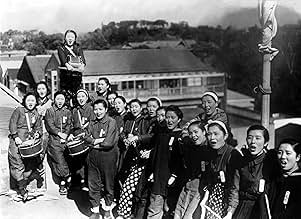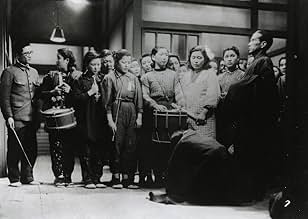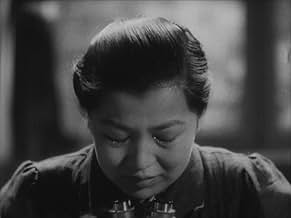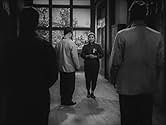IMDb RATING
5.6/10
2.7K
YOUR RATING
World War II film about female volunteer workers at an optics plant who do their best to meet production targets.World War II film about female volunteer workers at an optics plant who do their best to meet production targets.World War II film about female volunteer workers at an optics plant who do their best to meet production targets.
- Director
- Writer
- All cast & crew
- Production, box office & more at IMDbPro
Featured reviews
10matt605
If you study this film then you can learn much about Japan, World War Two, and Akira Kurosawa. This is the only film he made that was meant to be propaganda, but his earlier film Sanshiro Sugata actually played to themes more useful to a nation at war. If you make a film that matches the zeitgeist of your country, that's great. But be forewarned that your country's government may then ask you to inspire the people to fight on, and you would then make a propaganda film, which is what may have happened to Kurosawa. This fact shouldn't make you reject The Most Beautiful because cinema in all countries in WW2 was used in the war effort. Japan was no exception.
Kurosawa in interviews after the war revealed his dislike of the government censors. Toward the end of the war, Japanese were preparing for the possibility of the entire nation receiving an order from the Emporer to commit suicide, called "the Honorable Death of the 100 Million." Kurosawa didn't dispute that he would have followed the Emporer's directive, but did say that he and his colleagues jokingly agreed they would first go and kill all the censors.
The plot and action of the film is described elsewhere. There are things to watch for carefully as you view the film.
If you're in a university setting then there is one absolute advantage that you have -- access to a professor of management and organizational behavior. Why? Well, The Most Beautiful is practically a docu-drama on management science. The scientific methods of production and organizational management are more clearly documented in this film than in any other I can recall, anywhere. It also compares things like Stakhanovism to Hawthorne experiment studies and displays the early beginnings of total quality management and quality assurance methods later developed by Deming. If these terms are unfamiliar to you, then you need a professor of management science to watch the film and help you see what Kurosawa was putting in. Then consider that the film was released to the Japanese public, which assured that it would be viewed by American military intelligence organizations and the OSS.
Some specifics to look for in no particular order: the background music includes a sampling from Semper Fi, the USMC theme song; there's little talk of enemies but when they're mentioned, the British are named ahead of Americans; the factory managers back a young woman's rejection of her father's instruction to come home and take the place of his deceased wife, which is a break with tradition (almost the equivalent of bra-burning in wartime Japan); and, backgrounds are set in wartime Japan and reveal details of the industrial infrastructure.
There are many films by Kurosawa that feature sickness and health care in their plots. This one, Drunken Angel, Ikuru, The Quiet Duel, and Red Beard come to mind. Dodes' ka-den and Ran might also qualify as their main characters suffer from afflictions of the mind. Kurosawa's biggest films are Rashomon and The Seven Samurai, but his films with health and medicine in the plot are more prevalent in his career.
One caveat to The Most Beautiful is that it is long and does reflect the tastes of Japanese audiences who like their drama very obvious. Forgive yourself if you find Japanese drama becomes too boring in some places. The films can be very enjoyable and interesting, provided you approach them with the understanding that they are far different from what we experience as entertainment today.
Kurosawa in interviews after the war revealed his dislike of the government censors. Toward the end of the war, Japanese were preparing for the possibility of the entire nation receiving an order from the Emporer to commit suicide, called "the Honorable Death of the 100 Million." Kurosawa didn't dispute that he would have followed the Emporer's directive, but did say that he and his colleagues jokingly agreed they would first go and kill all the censors.
The plot and action of the film is described elsewhere. There are things to watch for carefully as you view the film.
If you're in a university setting then there is one absolute advantage that you have -- access to a professor of management and organizational behavior. Why? Well, The Most Beautiful is practically a docu-drama on management science. The scientific methods of production and organizational management are more clearly documented in this film than in any other I can recall, anywhere. It also compares things like Stakhanovism to Hawthorne experiment studies and displays the early beginnings of total quality management and quality assurance methods later developed by Deming. If these terms are unfamiliar to you, then you need a professor of management science to watch the film and help you see what Kurosawa was putting in. Then consider that the film was released to the Japanese public, which assured that it would be viewed by American military intelligence organizations and the OSS.
Some specifics to look for in no particular order: the background music includes a sampling from Semper Fi, the USMC theme song; there's little talk of enemies but when they're mentioned, the British are named ahead of Americans; the factory managers back a young woman's rejection of her father's instruction to come home and take the place of his deceased wife, which is a break with tradition (almost the equivalent of bra-burning in wartime Japan); and, backgrounds are set in wartime Japan and reveal details of the industrial infrastructure.
There are many films by Kurosawa that feature sickness and health care in their plots. This one, Drunken Angel, Ikuru, The Quiet Duel, and Red Beard come to mind. Dodes' ka-den and Ran might also qualify as their main characters suffer from afflictions of the mind. Kurosawa's biggest films are Rashomon and The Seven Samurai, but his films with health and medicine in the plot are more prevalent in his career.
One caveat to The Most Beautiful is that it is long and does reflect the tastes of Japanese audiences who like their drama very obvious. Forgive yourself if you find Japanese drama becomes too boring in some places. The films can be very enjoyable and interesting, provided you approach them with the understanding that they are far different from what we experience as entertainment today.
Like SANSHIRO SUGATA PART 2, this film was never released in the U.S. for political reasons. There's not any blatantly anti-American content, as in SSP2, but THE MOST BEAUTIFUL, filmed by government request, was a pro-Imperialist propaganda document.
Kurosawa gamely attempts to weave together a story which functions both as propaganda and as a tender coming-of-age story, but isn't entirely successful. This would have been a demanding proposition even for a seasoned pro, let alone a young director like Kurosawa, directing only his second feature.
The story follows a group of young girls working in an armaments factory in the latter days of WWII. The girls must increase production sharply. The girls suffer hardships of all sorts. One, Tao, emerges as the leader of the group. Through the travails of helping her coworkers meet their quotas, Tao learns courage, fortitude and compassion.
If all this sounds a little boring, that's because it is. Kurosawa's visual signatures are seldom seen. At least the performances are good, especially Yoko Yaguchi as Tao. Takashi Shimura has a thankless, do-nothing role as the foreman of the factory.
Kurosawa gamely attempts to weave together a story which functions both as propaganda and as a tender coming-of-age story, but isn't entirely successful. This would have been a demanding proposition even for a seasoned pro, let alone a young director like Kurosawa, directing only his second feature.
The story follows a group of young girls working in an armaments factory in the latter days of WWII. The girls must increase production sharply. The girls suffer hardships of all sorts. One, Tao, emerges as the leader of the group. Through the travails of helping her coworkers meet their quotas, Tao learns courage, fortitude and compassion.
If all this sounds a little boring, that's because it is. Kurosawa's visual signatures are seldom seen. At least the performances are good, especially Yoko Yaguchi as Tao. Takashi Shimura has a thankless, do-nothing role as the foreman of the factory.
Ichiban utsukushiku (1944) 'THE MOST BEAUTIFUL' is Akira Kurosawa's tribute to Japanese Women who supported the war effort (WWII) at the 'Home-Front'. It is analogous to films made in other countries at that time. The nations that participated in the conflict all called upon Women too help in the manufacturing process. Some successfully like Great Britain, Soviet Russia and the U.S.A. Others like China, Fascist Italy or Nazi Germany less so, with Imperial Japan falling in between. Not from lack of effort, but of resources.
Like LETTERS FROM IWO JIMA (2006) the film shows the war from the Japanese perspective. This is a propaganda film. That does not invalidate its message compared with the other participants in the conflict, it is just another point of view, made in wartime. The Women work in a optical factory which could pass for a 'Dickensian Workhouse'. Their work is important and they know it. The pressure of increased productivity with limited resources is clearly shown. It effects them all emotionally, physically and psychologically. The Men of the factory for the most part are unseen drones, except for the managers of the plant. They take a sensitive interest in the well being of their Female staff, without taking advantage of them. The War is largely unseen, but you know it is out there and getting closer all the time. The Director could see the end was coming, even if the Imperial General Staff could not.
The principal cast of Women actors are largely unknowns whose careers were brief before and after this film. They are all convincing in their roles and give believable characterizations. The only 'Star' recognizable too Western audiences would be the great TAKASHI SHIMURA. SHIMURA was a 'jake of all trades' for the TOHO Studios, Japan. His acting range spanned Business Men, Criminals, Detectives, Samurai and Scientists. Films of note, SHICHININ NO SAMURAI (1954) 'The Seven Samurai', GOJIRA (1954) 'Godzilla', CHIKYU BOEIGUN (1957) 'The Mysterians' and YOJIMBO (1961) 'Yojimbo, The Bodyguard'.
Those who have TCM or a well stocked local Library can take advantage of the films of AKIRA KUROSAWA and they should.
Like LETTERS FROM IWO JIMA (2006) the film shows the war from the Japanese perspective. This is a propaganda film. That does not invalidate its message compared with the other participants in the conflict, it is just another point of view, made in wartime. The Women work in a optical factory which could pass for a 'Dickensian Workhouse'. Their work is important and they know it. The pressure of increased productivity with limited resources is clearly shown. It effects them all emotionally, physically and psychologically. The Men of the factory for the most part are unseen drones, except for the managers of the plant. They take a sensitive interest in the well being of their Female staff, without taking advantage of them. The War is largely unseen, but you know it is out there and getting closer all the time. The Director could see the end was coming, even if the Imperial General Staff could not.
The principal cast of Women actors are largely unknowns whose careers were brief before and after this film. They are all convincing in their roles and give believable characterizations. The only 'Star' recognizable too Western audiences would be the great TAKASHI SHIMURA. SHIMURA was a 'jake of all trades' for the TOHO Studios, Japan. His acting range spanned Business Men, Criminals, Detectives, Samurai and Scientists. Films of note, SHICHININ NO SAMURAI (1954) 'The Seven Samurai', GOJIRA (1954) 'Godzilla', CHIKYU BOEIGUN (1957) 'The Mysterians' and YOJIMBO (1961) 'Yojimbo, The Bodyguard'.
Those who have TCM or a well stocked local Library can take advantage of the films of AKIRA KUROSAWA and they should.
During the World War II, the management of a war industry of optical instruments for weapons requests an effort from the workers to increase the productivity during four months. The target for male workers is an increase of 100% of the production, but the female workers, led by the dedicated Tsuru Watanabe (Yôko Yaguchi), ask the direction to surpass their goal from 50% to 70%. Along the period, the women have to overcome illness and their personal problems to complete their quote.
"Ichiban Utsukushiku" is a war propaganda and tribute to the Japanese female workers in times of war by Akira Kurosawa recommended only for fans of this great director. The plot is boring in many moments, but I liked to see the humanization of the nationalist Japanese workers and this unusual perspective from a people that were sooner defeated in the war. The winners usually write the history from their perspective and this film is a rare testimony from the Japanese point of view. Watanabe is an enlightened character with her dedication and positive leadership. My vote is six.
Title (Brazil): "A Mais Bela" ("The Most Beautiful")
"Ichiban Utsukushiku" is a war propaganda and tribute to the Japanese female workers in times of war by Akira Kurosawa recommended only for fans of this great director. The plot is boring in many moments, but I liked to see the humanization of the nationalist Japanese workers and this unusual perspective from a people that were sooner defeated in the war. The winners usually write the history from their perspective and this film is a rare testimony from the Japanese point of view. Watanabe is an enlightened character with her dedication and positive leadership. My vote is six.
Title (Brazil): "A Mais Bela" ("The Most Beautiful")
Typical of Japanese war-time propaganda, the film suggests that Japan's fascist ideology, its inculcation of fanatical obedience, its vast perpetration of unthinkable atrocities in a systematic manner, and its aggressive military expansionism can all be replaced by Japan's supposed victimization. Rather telling in this respect is the song that the girls repeatedly sing to boost morale, a song that recalls that barbarian Mongol conquerors once tried to invade Japan from China, but that the perpetrators of such heinous deeds of aggression could not possibly co-exist under the same sky with the innocent and pure Japanese-- this, of course, is being sung during a war that was begun when an utterly unprovoked Japan invaded China and slaughtered untold numbers of its population mercilessly.
All of this would be something that one could simply shrug off as the past blindness of war, but films such as these are more disturbing today than, say, Triumph of the Will because while Germany was forced to confront the horrors it had unleashed upon the world, most Japanese films even today (and textbooks for that matter) still tend to view Japan as a victim in the war (see, for instance, Kurosawa's own Rhapsody in August so many decades later). Assisted by the policies of the American post-war occupation, Japan has never had to come to terms with what it did to the planet, and what in human history can possibly more disturbing than a lack of accountability for the worst sins humanity can commit? And by the way, I say all of this despite the fact that Kurosawa is probably my favorite director.
All of this would be something that one could simply shrug off as the past blindness of war, but films such as these are more disturbing today than, say, Triumph of the Will because while Germany was forced to confront the horrors it had unleashed upon the world, most Japanese films even today (and textbooks for that matter) still tend to view Japan as a victim in the war (see, for instance, Kurosawa's own Rhapsody in August so many decades later). Assisted by the policies of the American post-war occupation, Japan has never had to come to terms with what it did to the planet, and what in human history can possibly more disturbing than a lack of accountability for the worst sins humanity can commit? And by the way, I say all of this despite the fact that Kurosawa is probably my favorite director.
Did you know
- TriviaIn order to save film during wartime, the Japanese government ordered films to be released to have no opening titles and thus giving no credit to most of the actors or workers on each film. This included "The Most Beautiful" (1944).
- ConnectionsReferenced in Kurosawa: The Last Emperor (1999)
- How long is The Most Beautiful?Powered by Alexa
Details
- Runtime
- 1h 25m(85 min)
- Color
- Sound mix
- Aspect ratio
- 1.37 : 1
Contribute to this page
Suggest an edit or add missing content






























